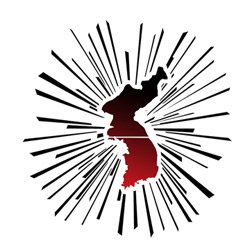| JUNE/JULY/AUGUST 2007 – NO. 16 |

Korean War
1950—1953
Memoir.
On the wall of my house in East Hampton hangs an old, water damaged black-and-white photo dating to September 1951. It is an informal portrait of what was left of the 3rd Platoon of Dog Company, 2nd Battalion, 7th Marines, a rifle platoon I would later command.
There are about 20 Marines posed against a steep hillside of shattered, shell-splintered trees, the Marines crouched or kneeling, some standing, armed and several helmeted, a few in "go to hell" caps, one or two smoking, all of them young but wary, hollow-eyed and gaunt, as drained and worn down as young men in their teens and twenties could be and still function. To their immediate front on the bare, dusty ground is a USMC-issue stretcher on which, snugly lashed by cord and web belts, lies the poncho-wrapped body of a dead Marine.
Over the years it had become something of a "cause" to me, finding out the identity of the dead Marine in the poncho. I long assumed this was their platoon leader, killed in a fight famous among Marines for its singular savagery, on an obscure little piece of North Korean high ground called, for its height in meters, Hill 749. When I sent a copy of the photo to check with my onetime squad leader, Sergeant John Fitzgerald, wounded in that fight, Fitz phoned to say that the dead man in the poncho was probably an assistant machine gunner named "Hollywood," attached temporarily to the 3rd Platoon. An assistant machine gunner is the guy who lugs the metal ammo boxes and who feeds the belt of cartridges into the gun and takes over if the gunner is hit. In combat, there is understandable confusion about casualties. And, wounded himself, Fitz didn't know Hollywood's last name, couldn't even be sure he was the "stiff" in the poncho. "Stiff" being the operative word in the combat Marine's jargon.
But Charles Curley, a machine gunner in that same fight, insisted the dead man was Joe McKenna of Elizabeth Street, San Francisco. Curley said McKenna of the 3rd Platoon was KIA September 13, 2951, on Hill 749.
"They were isolated on another knoll, ran out of ammo but still held the position."
Curley, and Dick Curtin and Lee Wimpee, all of whom fought in the Dog Company assault on Hill 749, fleshed out Joe McKenna's story. He was the third of three McKenna brothers killed in action in American wars. First Lieutenant Frank McKenna, USAF, was shot down over Germany in February 1944. PFC James McKenna, USMC, died fighting the Japanese on Saipan in June of that same year. Another McKenna brother lived to retire from the Marine Corps as a lieutenant colonel, and another boy, a sailor, was wounded by the Japanese but survived. And Joe died on Hill 749.
Dick Curtin said it was a war correspondent, arriving after the fight, who got the Marines to pose with one of their dead. It turned out to be Joe McKenna, whose corpse had conveniently just been brought down off the hill. The correspondent needed a stiff as centerpiece to his photo, and McKenna happened to be it. Wimpee told me that Artemise McKenna (Joe's mom) had regularly sent cookies to her boy, and continued to bake and send cookies to Marines of the 3rd Platoon even following Joe's death.
Three McKenna boys dead and the mother was still sending cookies. Dog Company Marines remember those cookies.
The normal Marine rifle platoon numbers 45; there are only 20 men in the photo — the rest were dead, or wounded and evacuated. In the otherwise unremarkable four-day fight for Hill 749, 90 American Marines died, 714 were wounded. A nothing fight for a lousy no-name ridgeline, hardly rating a footnote in history books, and we took 800 casualties.
To the extreme right front of the picture is the platoon sergeant, Ronald E. Stoneking, a tall, rawboned, and very hard man, seated on a rock and looking at the camera, his mouth flat and unamused, his eyes narrowed, both big hands easily around the barrel of his carbine.
Stoneking lives now in North Carolina in a town called Swansboro, on VFW Road, but as a teenager he drove a bootlegger's truck in dry Oklahoma, running illegal hooch. He was married to an attractive brunette Wave who sent him sexy photos of herself. He had fought the Japanese all the way across the Pacific, had lost platoon leaders before and, presumably, would lose platoon leaders again. Platoon sergeants knew those were the odds on rifle platoon leaders, those were the ways of the Corps, of the goddamned world.
And, at Thanksgiving of 1951, I would inherit the 3rd Platoon from, and replace, tall and balding Lieutenant Clair "Ed" Flynn, who had also been hit on 749 and was being rotated home (Dog Company was going through platoon leaders pretty fast that season). An unimpressed Sergeant Stoneking regarded me narrowly, a green lieutenant fresh out of Quantico, a skinny, wide-eyed kid, looking about 17 and puffing a cigar (I imagined it lent me the authority and maturity I sorely lacked). Flynn had led them on Hill 749, the men knew his worth, they knew and trusted Stoneking, and who the hell was I?
For the next months up there on the line, and despite whatever doubts he may have had, Stoney and I shared a small, low, cramped log-and-sandbag bunker, into which we had to crawl, and in which neither of us could stand up, and where we slept head to toe at night in our sleeping bags. Two grown men, sleeping in their clothes (only boots came off and wet socks exchanged for dry), carbines stacked, revolver work even in the sleeping bag, grenade piled with the ammo in a corner, our only light a candle, augmented at mealtimes by a Coleman stove or a purple-flamed sterno can. Simply stated, we lived like animals, stinking, itchy, smelly, covered with scabs, minor sores, rashes, and abrasions. Dingleberries? The reek of filthy bodies? Don't ask.
A sergeant we both knew that winter, a good man, maddened by the incessant wind whistling through his firing port, cracked and began firing a BAR inside his own bunker, shooting at rats that weren't there. If the Reds didn't get you, the cold, the wind, the weather, would. The battalion's three rifle companies once went 46 days without changing clothes or taking a shower, hundreds of healthy young men living in holes in the ground. In our bunker, between my cigars and the smoke of the Coleman stove and the candles we burned, when we spit, the phlegm came out sooty, suggesting lamp black, and you wondered about the state of your lungs. Healthy young men, by civilian standards very young men, hacking and coughing, old and rotten before our time.
And though he may have only tolerated me, as a city boy, I came to enjoy Stoneking's homespun style. We swapped bootleg yarns. How the Baptists and the bootleggers teamed up down in Oklahoma to vote against Repeal, since both the church and the bootleggers relied on Prohibition. He had colorful stories of bootleg drivers, illegal stills, and revenue agents, of shootouts and jail sentences.
I tried to keep up by telling Stoney about Sheepshead Bay, where they brought in the illegal by boat at night or in the fog (there was a John Garfield movie about it, Out of the Fog), landing it out of rowboats on the beaches or at the piers along Emmons Avenue. I told him how one of the Lundy brothers, the family that owned the biggest restaurant on the waterfront, was killed in a shootout with the Feds. In Sheepshead Bay rum-running wasn't considered a mortal sin, and they named the Lundy Memorial Chapel in our local Protestant church after the late, lamented Lundy.
"I didn't know you were Protestant, Lieutenant."
"I'm not. But I once went there for a wedding. Pete Lundy, who was a Marine during the war, seagoing, aboard a battleship of Task Force 58, came home on leave and married Dorothy Geistweit, prettiest girl on our block."
"Seagoing?" Stoneking shook his head. No seagoing bellhop of a Marine deserved the prettiest girl on the block. Infantrymen think that way.
But it was my story; I'd gone to the wedding. Even though the nuns at Saint Mark's warned us that if a Catholic went to a service in the Protestant church, he'd go to hell.
"And you went?" Stoney asked.
"I did. I was 13 or 14 years old and I took the chance."
Stoneking perked up. Maybe this Brady wasn't just another big-city phony or a New York sharper. Anyone who stood up to the Roman Catholic Church to defy nuns and the pope, and was willing to risk hellfire to attend a Protestant service, maybe was OK. And gradually, we grew on each other. The sergeant even showed me some of the sexy pictures his wife sent him.
I learned from Stoney, as I did from the platoon guide, Wooten. He was older than Stoneking, much older than me, and had been up and down the promotion ladder several times, a grizzled career Marine who took a drink, and if you asked about the state of the food supply, Wooten was capable of lines such as: "Lieutenant, we got rations ain't never been eat!"
But it was the cynical Stoneking who informed me of a reputation I'd earned suffering from diarrhea my very first week as platoon leader. There had been shelling through heavy snow one night and probing by the North Korean infantry. So much so that after my third or fourth precarious trip down the icy reverse slope in the dark to the holed and creosoted ammo box that served as a toilet, I simply gave up. I didn't intend being killed maintaining the niceties, and distinguished myself ever after by taking a frightened crap on sheltered ground at the bottom of a trench.
"You know, Lieutenant, when you first got here, they had a nickname for you," Stoney said months later.
"Oh, what was that?"
"'Shit-Trench Brady.'"
It had been uncharacteristically thoughtful of Stoneking not to share that intimate little disclosure until I'd earned a small measure of respect from the platoon, whom might justifiably been thinking, We're short an officer and they send us this jerk kid?
We would fight in North Korea the rest of that fall and winter and then in defense of Seoul the following year. Captain Chafee would go home, Stoney would be rotated to the rear, green replacements would come in, and I would be promoted but stay on with the battalion, fighting up there on the line. No one laughed at me anymore, no one coined nicknames. I was smoking cigars only because I enjoyed them, not as part of a costume. There was no costume any longer.
And I enjoyed the irony that I was still here, and in combat, while that decidedly hard man, Sergeant Stoneking, was back there in some cushy billet, playing rear-echelon pogue. Please do not inquire of me what "pogue" means; if you are a Marine, you know.
From The Scariest Place in the World, copyright © 2005 by James Brady. Courtesy St. Martin's Press/Thomas Dunne Books.
|




